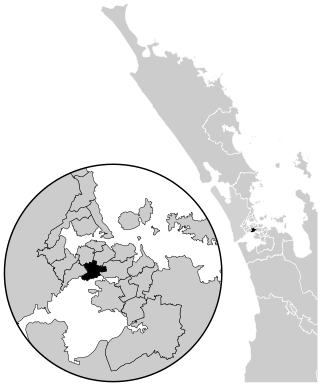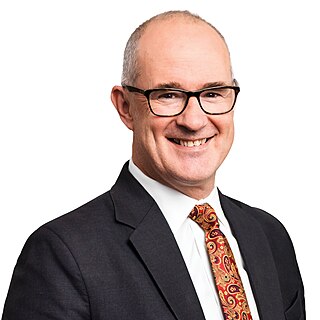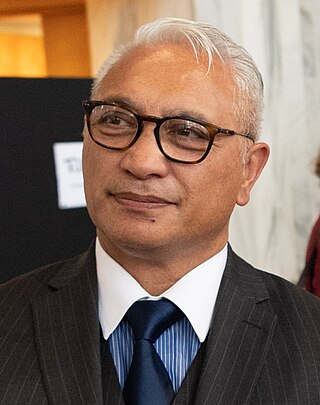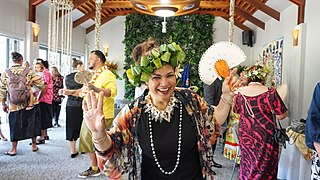Matthew Peter Robson is a New Zealand politician. He was deputy leader of the Progressive Party, and served in the Parliament from 1996 to 2005, first as a member of the Alliance, then as a Progressive.
Belinda Jane Vernon is a former New Zealand politician. She was an MP from 1996 to 2002, representing the National Party.

Suzanne Mary Moroney, generally known as Sue Moroney, is a New Zealand politician. She is a member of the New Zealand Labour Party and was a Member of Parliament from 2005 general election until her retirement in 2017.

Rainbow Labour is the LGBT+ sector of the New Zealand Labour Party.

Charles Pierre Chauvel is a New Zealand lawyer and former politician who was a Labour list Member of Parliament (2006–2013) until his resignation to take up a position with the UN Development Programme. He was the first New Zealand MP of Tahitian ancestry.

The 48th New Zealand Parliament was a term of the Parliament of New Zealand. Its composition was determined at a general election held on 17 September 2005. The new parliament met for the first time on 7 November 2005. It was dissolved on 3 October 2008.

The 2008 New Zealand general election was held on 8 November 2008 to determine the composition of the 49th New Zealand Parliament. The liberal-conservative National Party, headed by its parliamentary leader John Key, won the largest share of votes and seats, ending nine years of government by the social-democratic Labour Party, led by Helen Clark. Key announced a week later that he would lead a National minority government with confidence-and-supply support from the ACT, United Future and Māori parties. The Governor-General swore Key in as New Zealand's 38th Prime Minister on 19 November 2008. This marked the beginning of the Fifth National Government which governed for the next nine years, until the 2017 general election, when a government was formed between the Labour and New Zealand First parties, with support on confidence and supply by the Green Party.

Maungakiekie is a New Zealand parliamentary electorate, returning one Member of Parliament to the New Zealand House of Representatives. The current MP for Maungakiekie is Greg Fleming of the National Party. The electorate's name comes from Maungakiekie / One Tree Hill, a large and symbolically important hill at the western end of the seat.

Mount Roskill is a parliamentary electorate in Auckland, New Zealand, returning one Member of Parliament (MP) to the New Zealand House of Representatives. Phil Goff of the Labour Party held the seat from the 1999 election until he resigned from Parliament on 12 October 2016 after contesting and being elected Mayor of Auckland on 8 October 2016 in the 2016 mayoral election. His resignation necessitated a byelection in this electorate which was won by Michael Wood.

Peseta Samuelu Masunu "Sam" Lotu-Iiga is a former member of the New Zealand Parliament for the Maungakiekie electorate, having been elected in the 2008 election. Lotu-Iiga was one of two National Party Pasifika MPs. Lotu-Iiga holds the Samoan high chiefly title of Peseta.

Philip Stoner Twyford is a politician from New Zealand and a member of the Labour Party. He has been a Member of Parliament since 2008. He is the Labour Party MP for Te Atatū.

Kelvin Glen Davis is a New Zealand politician. He was a member of the House of Representatives, and was a senior minister in the Sixth Labour Government and the deputy leader of the New Zealand Labour Party from 2017 to 2023.

The 50th New Zealand Parliament was elected at the 2011 general election. It had 121 members, and was in place from December 2011 until September 2014, followed by the 2014 general election. The first sitting of the 50th Parliament was held on 20 December 2011, where members were sworn in and Lockwood Smith was elected Speaker of the House. This was followed by the speech from the throne on 21 December. John Key continued to lead the Fifth National Government. Following the resignation of Smith, David Carter was elected Speaker.

Alfred Ngaro is a New Zealand politician, serving as leader of NewZeal since 2023. He was a list member of the New Zealand House of Representatives from 2011 to 2020, representing the National Party.

Le'Aufa'amulia Asenati Lole-Taylor is a former New Zealand politician. She was a member of the House of Representatives for the New Zealand First party from 2011 to 2014.

Denise Adrienne Lee is a New Zealand politician who was the National Party's Member of Parliament for the Maungakiekie electorate from 2017 to 2020. She was previously an Auckland Council local body councillor.

Priyanca Radhakrishnan is a New Zealand politician who has been elected to the New Zealand parliament since the 2017 general election as a representative of the New Zealand Labour Party and was Minister for the Community and Voluntary Sector from 2020 to 2023.

Kushmiita Parmjeet Kaur Parmar is a New Zealand politician.
The 2016 New Zealand National Party leadership election was held on 12 December 2016 to determine the next Leader of the National Party and the 39th Prime Minister of New Zealand. A secret exhaustive ballot of the 59-member National parliamentary caucus was to be used in the event of a contested leadership.

Pasifika New Zealanders are a pan-ethnic group of New Zealanders associated with, and descended from, the indigenous peoples of the Pacific Islands outside of New Zealand itself. They form the fourth-largest ethnic grouping in the country, after European descendants, indigenous Māori, and Asian New Zealanders. Over 380,000 people identify as being of Pacific origin, representing 8% of the country's population, with the majority residing in Auckland.


















